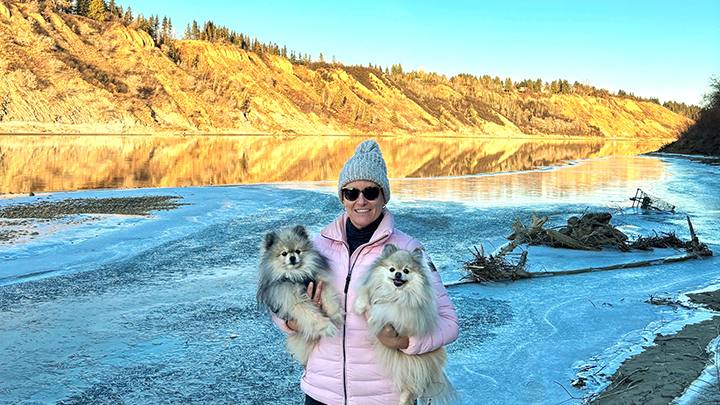
January 22, 2024

Samantha Taylor, a Provincial Educator/Coordinator for Critical Care, enjoys a sunny walk along the North Saskatchewan River near Fort Edmonton with her twin Pomeranians Harley and Max. Photo supplied.

Registered Nurse Anran Liu signed up in 2011 for the very first session of the Orientation Program for Adult Critical Care in Alberta (OPACCA), which readies nurses for the challenges of working in the ICU. This January, the program marks a milestone with its 100th session. Photo supplied.
Story by Gregory Kennedy
To succeed once is a wonderful thing. To do it 100 times in a row is absolutely outstanding. To do it while training generations of new ICU nurses across the province is simply life-saving for Albertans in their moments of greatest medical need.
This month marks the 100th session of the Orientation Program for Adult Critical Care in Alberta (OPACCA), which gives RNs entering Adult Critical Care Nursing both the theoretical and clinical knowledge they need to safely and independently care for a stable, mechanically-ventilated patient.
“It's for all nurses who have not worked in an ICU before,” says Samantha Taylor, a Provincial Critical Care Educator/Coordinator with the Associate Chief Nursing Office, who shares teaching duties with her similarly-titled colleague Christine Filipek. “What we love about this work is that it’s so interesting. There’s always something to learn. Every day is different.”
Participants enjoy four weeks of lecture-based online learning as well as ‘buddy shifts’ in the ICU they’re hired in. Across Alberta, there are 22 adult ICUs.
Launched in 2011, this Alberta Health Services’ (AHS) program is the only one of its kind in Canada and offers eight sessions a year. All ICU nurses in the province attend the online theory portion together. OPACCA has advanced the careers of more than 2,100 nurses with the training to excel in this high-pressure healthcare environment and provide the best care for their patients.
Developed by ICU Clinical Nurse Educators in Alberta, the OPACCA program is the result of collaboration between AHS Adult Critical Care units, the Critical Care Strategic Clinical Network and Clinical Transition Education.
“The types of people we see in the ICU are basically the sickest people in the building,” says Taylor. “Transplant patients. Unstable patients at risk of cardiac arrest. Medical emergencies. Some ICUs do two types of dialysis. In cardiovascular, we may deal with issues involving balloon pumps or ventricular assist devices. It’s pretty interesting. It’s pretty busy. There’s a lot going on.
“In my teaching, one of the biggest things I talk about is the value of teamwork. You need your fellow nurses. You need the respiratory therapists, the physicians, the dietitians, the social workers — all of the team is extremely important for us to be able to do our jobs well, if we’re to achieve the best outcomes.
“You know, saving a life is amazing. As well, if we’ve done all that’s humanly and medically possible, having allowed somebody to have a peaceful death is also amazing.”
One of the pioneers of the OPACCA program is Anran Liu, a 2009 nursing grad, who fondly remembers attending the premiere session back in 2011. Today, she’s an ICU nurse at the University of Alberta Hospital in Edmonton — and credits the knowledge she gained through the experience for giving her the career she always wanted.
“When the University ICU hired me, I didn't have much acute-care experience, having come from Long Term Care, and later the Royal Alex surgical float pool,” she says. “I like how this program first provides the knowledge for each system you need to know, and then they put you right on the unit, so you can see firsthand how they work, as you focus on that system.
“For example, one week we worked on cardiology and things like ECG (electrocardiogram) tracing. After the classroom learning, when we went to the unit, we could watch how the nurses do their 12 leads and how they would interpret all their ECG readings. This was really helpful. And then the next week, we would move on to the respiratory system, or neurology, for example. The program also touched on nephrology, transplants, sepsis and other topics.”
Liu says she benefited from the depth of learning presented by OPACCA. “They gave me more scenarios to study — and then they brought in all the experts from each unit, for each system we covered. Having ‘buddy shifts’ made me feel more comfortable in my new environment. I felt very supported.”
Taylor, too, emphasizes how support is paramount — and how OPACCA also gives its RNs a variety of resources and tools to mitigate the burnout and moral distress that can arise from the emotional and psychological challenges they face daily. Chief among these is the Psychological Resilience Entry to Practice Awareness and Readiness Education (PREPARE) program.
“We’re incorporating four hours of Mental health education that’s supported by the Mental Health Commission of Canada. Nurses receive education to learn how to recognize the symptoms and behaviours of mental illness and burnout in themselves and their colleagues — and then get resources on what to do and how to talk about it.”
Down the road, the OPACCA team aims to make the program more interactive, add more case studies through module-based learning, and would like to have an educator online in real time to answer questions for nurses as they work through the modules. “We’re hoping to make it more, you know, fun!
“I think ICU is the best job,” adds Taylor, who’s invested 33 years of her life in healthcare — gaining ICU experience in general systems, burns and cardiovascular — before becoming an educator a decade ago.
“I think if you're going to work anywhere as a nurse, that's the place to go. It’s so interesting. The teamwork is amazing. My colleagues that I've worked with over the years are some of my favourite people on the planet.”
After 13 years in ICU, Liu finds her job rewarding. “I love working with all the physicians, dietitians, pharmacists and all the different professions that come into play here. We really work as a team.
“You get to spend a lot of one-on-one time with your patients. You know them. You know their stories. You know their family. And then you know how to make them get better.”
Liu has a nugget of advice for nurses wondering about moving into adult critical care or giving the OPACCA program a go.
“Just take the opportunity. The educators are very supportive. There’s lots of resources on the unit to help you grow. You’ll develop your critical thinking skills. You will learn a lot.”